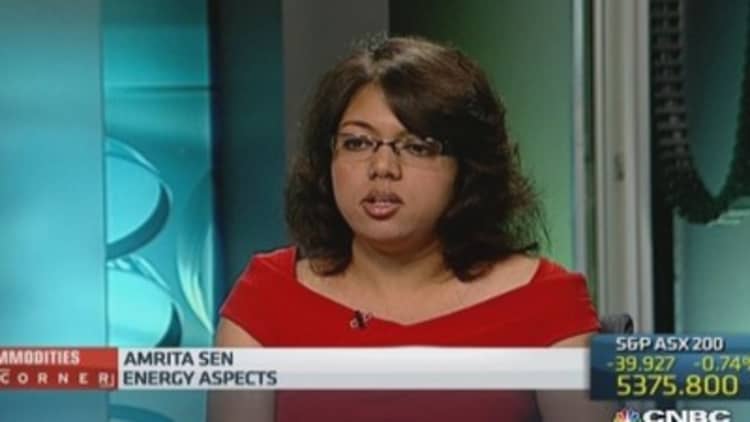Geopolitical tensions between Russia and the West and troubles in Middle East have dominated headlines all summer, but investors so far have managed to shrug off fears, with the market reaction remaining fairly contained.
The Organisation of Petroleum Exporting Countries (OPEC) basket of 12 crude oils slid to $94.31 on Tuesday, the lowest level since July 2012 even as the U.S. confirmed 14 air strikes against ISIS, with large explosions confirmed in eastern Syria.
As recently as June, the cartel was getting as much as $110 per barrel. Political tensions traditionally impact markets through an oil price shock or disappointing growth – so why are things different this time?
Chief oil analyst at Energy Aspects, Amrita Sen said the age-old supply and demand argument was to blame – with an oversupply driving prices lower.
Read More
"I do think that it still sends a signal, that the Middle East isn't really where companies will want to invest in the future – so I think this is much more of a longer-term issue. But for the shorter term, given the kind of oversupply we have people are viewing this for now as contained – southern Iraqi fields are not going to get affected," Sen told CNBC.
Sen predicted that Brent crude, currently trading at $96.59 per barrel, could fall a further $10 per barrel in the short term.

The demand and supply factors that have been bubbling under for two years are now finally hitting the oil markets according to research analysts at Citi, which is damping the connection between Middle East turmoil and financial markets.
Read MoreChoking on oversupply, oil could fall another 10 percent
"The dynamic that drove oil's rally last decade was robust demand growth meeting consistent disappointments on the supply side. Citi believes those two have now flipped in this decade," head of energy strategy at the group, Seth Kleinman said.
The U.S. shale revolution is a key factor hitting both the demand and the supply side, as the spread between oil and gas prices is encouraging a shift from oil to gas in transportation, petrochemicals and other oil demand sectors, he said.
"The only clear path to rebalancing the oil markets — absent some new and significant disruption — is for Saudi Arabia and OPEC to start to pull back on production to rein in the inventory builds," he added.
So should investors steer clear of the likes of oil majors BP and Total while the downward pressure on oil price looks set to continue at least in the short term?
Read MoreOil smuggling, theft, extortion: How ISIS earns $3M a day
"A lot of the margins get squeezed – but it's just by how much. We are looking at total costs of production and they are still exceptionally low," global equity strategist at Coutts James Butterfill, told CNBC, who said investors are also being rewarded with a very attractive dividend.
"For BP for instance, they (costs of production) are $25 per barrel. At Total they are $56, $57. So there is still a long way to go before these energy companies are not making any money. We own BP, we think these issues (relating to Russia and Macondo) will sort themselves out over the longer term," said Butterfill.


